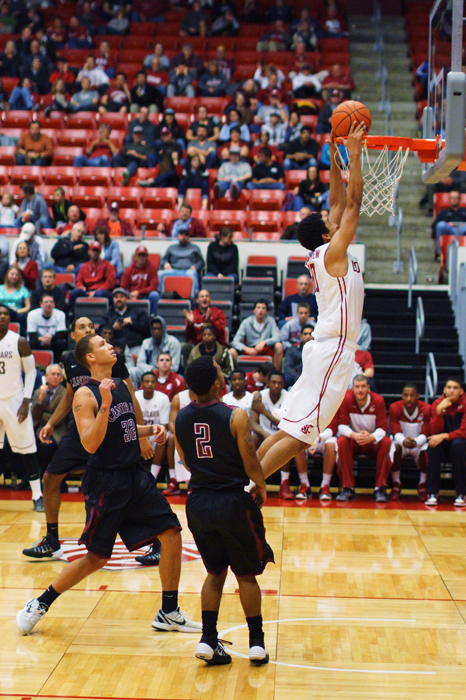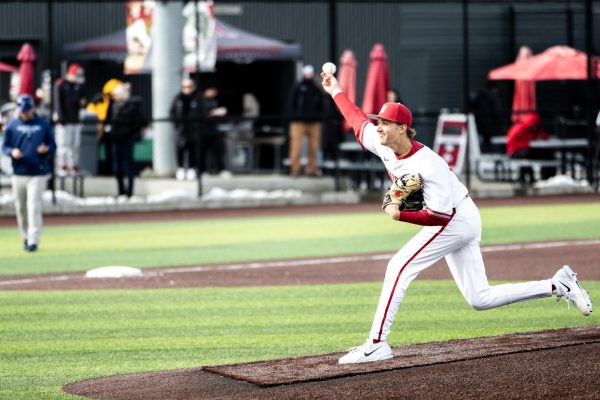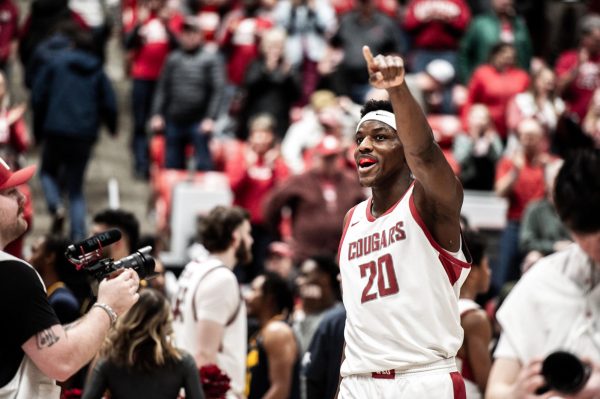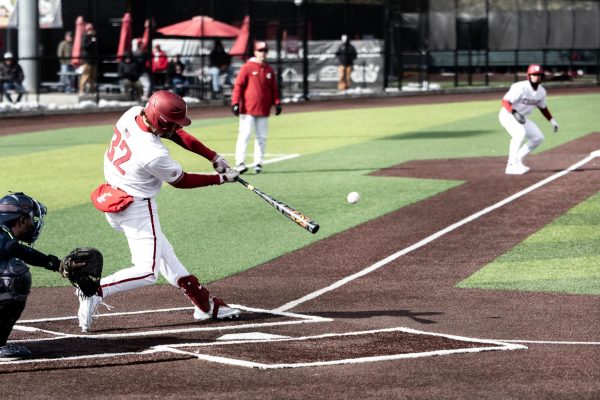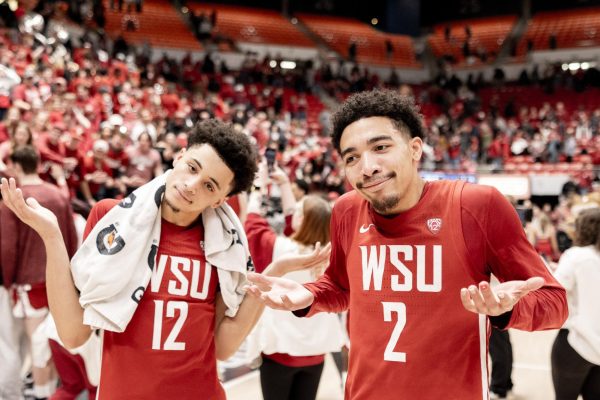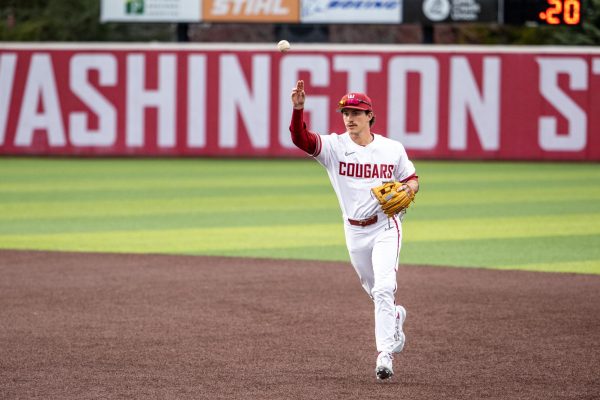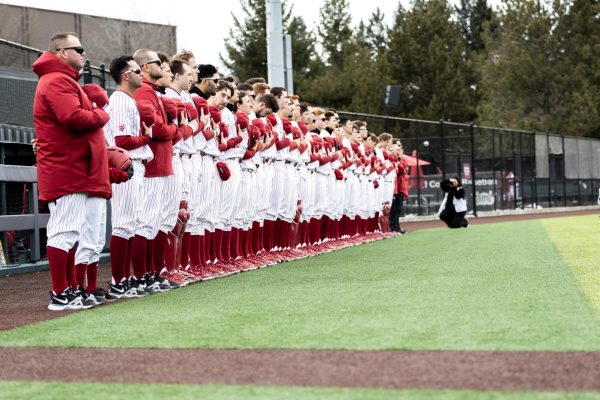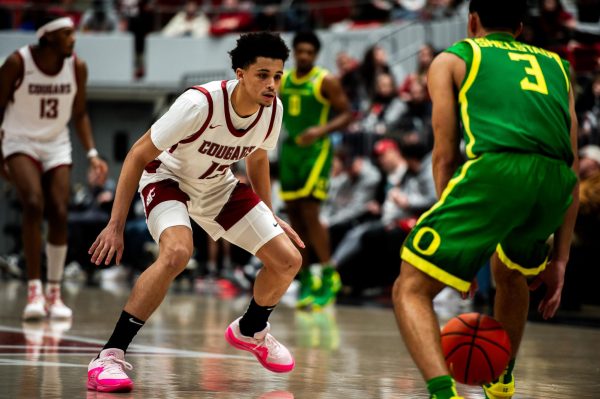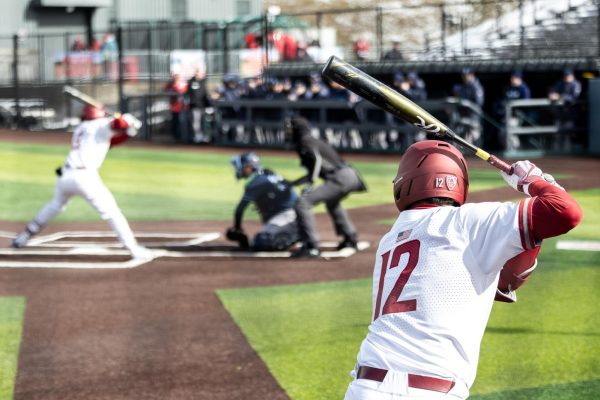Let the games begin
Redshirt junior guard Dexter Kernich-Drew puts home a dunk during an exhibition game against Central Washington in Beasley Coliseum, Friday, Nov. 1. The Cougars defeated the Wildcats 93-56.
November 8, 2013
No blood was spilled, but bonds were built during last weekend’s war simulation field training event.
M16 rifles and M240 machine guns rattled, boots rustled, and helicopter engines roared above the shouts of Washington State and University of Idaho students last weekend. As security measures increased, raids and ambushes were conducted on both the offensive and defensive ends.
Despite harsh weather conditions, 121 Reserve Officers’ Training Corps (ROTC) Army cadets battled both imaginary foreign enemies and themselves.
Two platoons tackled five missions over the course of two and a half days. Each platoon had four squad leaders who traded responsibilities with each mission.
The purpose of the war simulation was to give these men and women time to practically apply their training on the field. As full-time students, they don’t get more than nine hours of minimum ROTC education a week between lab and physical training.
“I’d like to keep them busy 80 hours a week but I can’t,” Lieutenant Colonel Christopher Heatherly said.
Heatherly, who has been working with WSU since July 2014, led the operation as an extra opportunity for his cadets to apply their academically acquired skills. Heatherly said classes and labs aren’t enough to prepare them for their post-college careers.
“In our profession a bad day gets someone killed,” he said. “I know that sounds hokey, but its reality. They need this practice.”
Field training not only allows the cadets to practice survival, sustainability and leadership, but also how to work as a unit of force while maintaining their individuality on the battlefield.
Cadet John Park, a senior nursing major at WSU Spokane, had the opportunity to practice his major while becoming a soldier. Park took skills he learned through his coursework and applied them to his service as a medic for one of the two platoons.
The program and field training allows Park to build relationships with people who are focused on similar long-term goals.
“ROTC gives you structure,” he said. “I’m thankful for the comradery.”
Park began studying at WSU in 2011 when he moved to the United States from the island of Saipan, located near Guam and the Philippines. His parents wanted him to become an officer, so he enlisted with the National Guard Reserves before he left.
Once he started pursuing nursing, he joined the ROTC Army to keep his contract active. The program allowed him to pursue an officer position while continuing to help people and study science.
“I want to go two years on active duty after school,” he said. “Then I want join the Doctor of Nursing Practice program. My long-term desire is to get my doctorate and become a nurse practitioner.”
Cadet Marie Frazier, a sophomore studying neuroscience, also found ROTC to be a guiding hand into a career field she plans to pursue after school. Her responsibilities shifted every mission in the same platoon as Park.
“In high school I knew the army would be a good way of getting my foot in the door of the veterinary profession,” she said. “It’s better than trying to pursue different jobs and experience when everybody else is trying to do the same thing. It’s an endless loop.”
After doing a bit of research, Frazier traveled to WSU from her hometown in Arizona specifically for their army program. She received a four-year national board award that allowed her to make out-of-state schooling possible.
Two years into her experience, Frazier already echoes sentiments expressed by Park.
“I can rely on people in ROTC very well,” she said. “We’re like a large family away from home; I know everyone has my back.”
Leaders have taught her how to put school first, then ROTC, then everything else in a way that doesn’t spread anyone too thin. While Frazier acknowledges her course load is a struggle when paired with ROTC, she has found a way to work with it.
“On average I spend about nine hours a week in physical training and labs,” she said. “Then I take an average amount of credits and am in the Honors College. Organization and the resources ROTC provides help me manage it all.”
Heatherly acknowledged that trying to juggle training as a soldier and completing school work is the most difficult part of ROTC.
“The hardest part of my job is finding a balance,” he said.
Some of those students manage to find a means of balancing on their own rather than relying on ROTC. Heatherly said it becomes the program’s goal to simply help them make that means of balance sustainable.
Cadet Carter Galgano, a freshman pursuing a psychology degree, discovered that Christian faith is what helps him find balance in all aspects of life. Galgano expressed this to Heatherly, who was able to introduce the cadet to ROTC’s chaplain program.
“My faith determines everything that I do,” Galgano said. “I want it to impact what I do on the field.”
Galgano has gained the responsibility of leading prayer before and after missions, while also making himself available for spiritual support. Troops sought spiritual support during the field training as well.
“We can’t proselytize,” Heatherly said. “But we can surely encourage these positions.”
The additional programs available through ROTC will occasionally influence the cadets’ long-term goals. This is the case with Galgano, who has now decided to pursue a chaplain position long-term.
He said everyone on the field puts their faith in themselves, their brothers or some kind of god. Galgano said it’s important to understand what that is before you dive into action.
“I’ve never been to war or on a battlefield, but I understand that death can be very taxing,” he said. “I don’t want to be someone who people just depend on in all of that, but someone who points them to Christ and is always encouraging.”
For the time being, he plans on finishing his four years with ROTC and then getting a master’s degree in divinity. He plans to enlist in the army and become a chaplain.
Park, Fraizer and Galgano’s desires are reflective of all 121 cadets who trained this weekend. Each of them came together, with their own individual talents, and worked to complete all five missions.
In a final flurry of fire, the two platoons charged down the slopes of Camp Seven Mile Sunday morning in their last raid against enemy forces. Each individual in their respective squads shot blanks, launched mortars, and swiftly secured the premises with zero casualties.
Celebrating their victory the platoons drove back together closer than before and ready to continue pursuing their passions back on campus. Cadets and their superiors will continue training until the beginning of May.


